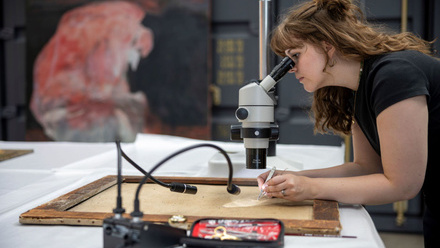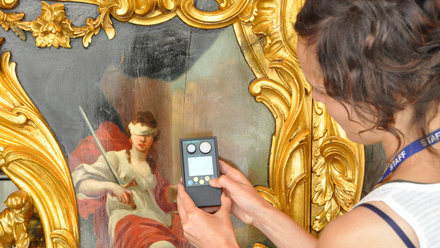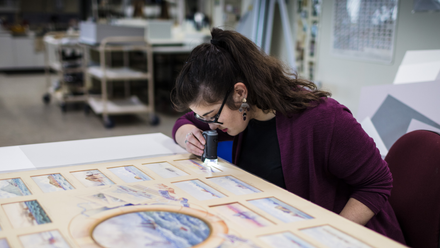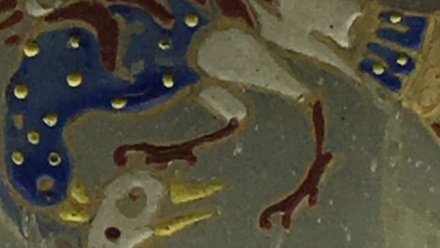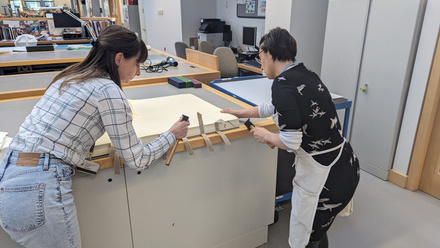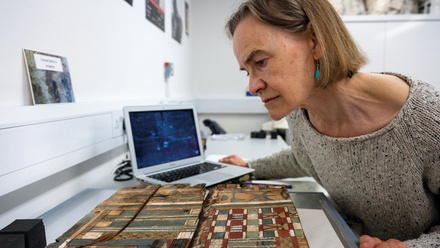Lorraine Finch ACR: "Other things that conservators do"
How I became involved...
2020 was a funny old year. Employed or self-employed, it threw a spanner in the works, derailing our plans and pushing us all onto different routes.
For me the announcement of the first Lockdown in March postponed all of the practical work that was in progress and cancelled all of the work that was in planning. It was a worrying time. It would have been more so had I been reliant on a limited source of freelance work.
Fortunately I had accessed free business 1:1 mentoring via Start East, and carried out an exercise* to help me to pivot and restructure my work. As a result of this I have been diversifying the areas that I work in (a process that continues). It is this diversification that has enabled me to continue working through the various Tier restrictions and Lockdowns 1,2 and 3.
* You can find out more about this exercise at Museum Freelance Restructuring and Pivoting your Business.
Challenge the conservator stereotype...
One of the areas that I have diversified into is digital. Some people may question why a conservator wants to work with a digital project.
Conservators love the past and enjoy working with old things so surely all conservators are backward looking? Conservators must by default dislike technology. Conservators are on the whole luddites?! I’m sure you’ve heard such statements as these bandied about?
I say challenge the stereotype. As conservators we share commonalities. There are traits which we share and shared reasons why we were, and still are, attracted to the profession; we do love the past, we do like old things and we like getting up close with the items.
However, we are not all the same. Conservators bring many varied skills, knowledge and perspectives to the table. We have more skills and knowledge than we realise. We often sell ourselves short. Many of our skills and knowledge are transferable.
You might like to carry out a skills and knowledge audit. To do this, list 20 to 30 of your strengths and skills, and then underline how many are transferable. You may be surprised how many are. I was. Of those I listed, only one was not transferable!
Simple words such as ‘collections’ and ‘curating’ have different meanings in each sector, and this has caused confusion. At times I feel like a field anthropologist...help[ing] two communities understand one another.
Dance Canada Danse [DCD]
The digital project that I have the privilege to be involved in is a two-year development programme to connect users with the DCD Collection. It’s an exciting and innovative programme.
The user-led design project will see us create an archive that will be a co-created and co-managed collaboration between institutions, organizations and individuals. We base our work on the idea that an archive in the age of the web is not about ‘creating a portal’, but about creating an environment where everyone can contribute, access and share.
We never start with code. We ask what people want first. The approach is 'Less technology, and more focus on contact’.
We started by investigating best in class examples of digital archives. The results of this research are written up and available in Designing for People Not Things. Now we have the exciting task of creating that environment via DCD Labs. What we have currently, looks like this:
We work with the process of Build, Engage, Iterate. My role is to build the community of users, to engage with them, to engage them, and to seek their comments and stories to enable us to build the open digital archive that they want, need and will use.
One role I hadn’t anticipated when I started was that I would be bridging the gap between the heritage professionals and the tech professionals. It is interesting to observe the misunderstandings that occur as a result of each sector having their own methodologies.
The most obvious example is the different usage of terminology. Simple words such as ‘collections’ and ‘curating’ have different meanings in each sector, and this has caused confusion. At times I feel like a field anthropologist using their 27 years of observation to help two communities understand one another.
We engage with our community in a number of ways, the most interactive and immediate being our Live Labs. The most recent Live Labs have offered users the opportunity to experiment and play with what we’ve developed so far and for them to build what they want by making their comments.
The Live Labs have included time for users to have a go and get involved. Head over to DCD Discover now and have a go yourself. Add a picture, upload some sound, put on a copy of the ticket of the last gig you went to. Experimentation is encouraged!
And Finally…
I thoroughly enjoy working on this project. It’s great to work with people from other sectors. It’s a fantastic opportunity to learn more and experience alternative ways of working and thinking.
It’s also fascinating to see cultural heritage through the eyes of people who aren’t involved with it on a day to day basis, which challenges me and my preconceptions. I’m looking forward to the next 12 months.
I encourage you to review your skills, knowledge and experience. You know a lot more than you think you know, and you have a lot more to offer than you realise.
If you’d like to be involved with this brilliant project you can Join DCD Labs here.
If you have any questions or comments please contact me.

